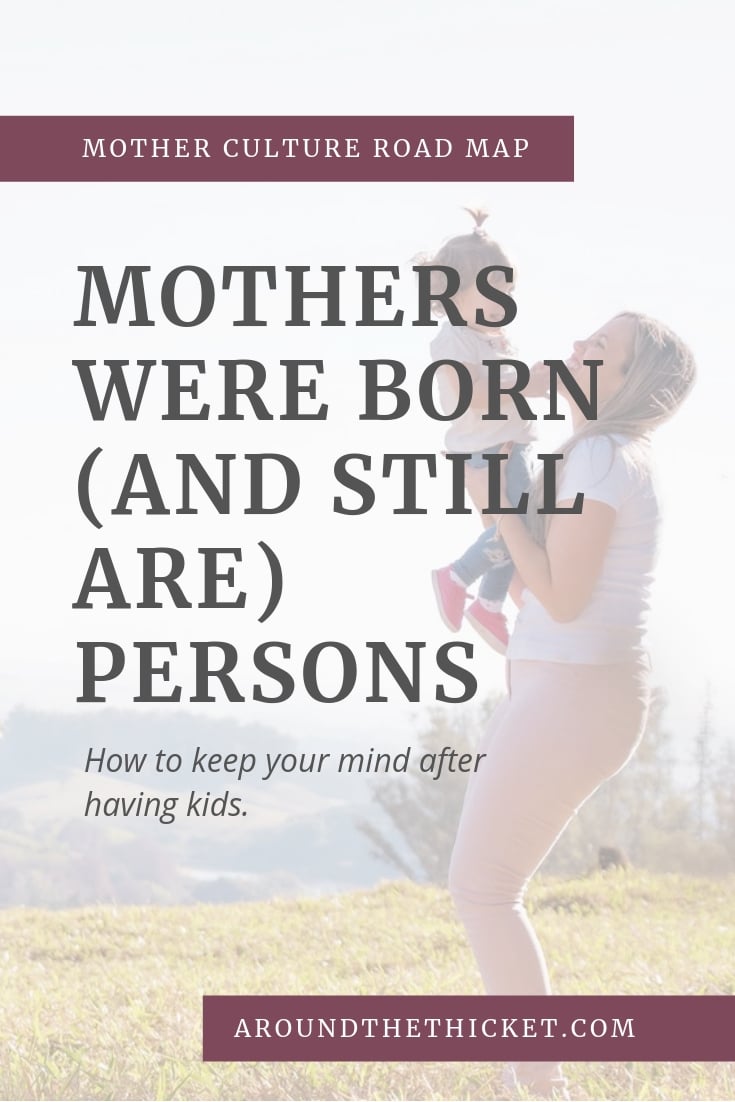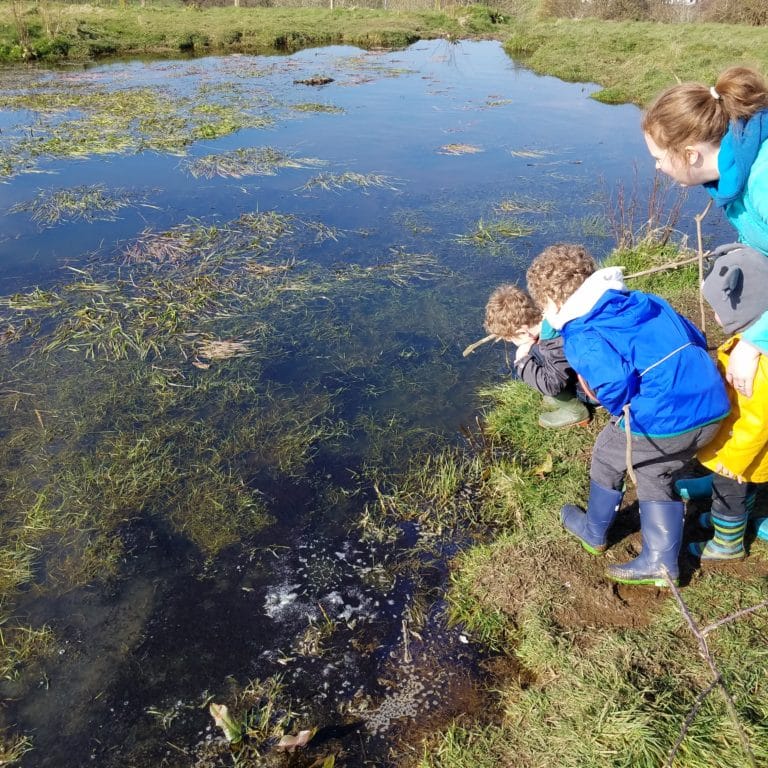Mothers were born – and still are – persons.
I have always wanted to be a mom. The stay-at-home variety, like my own mother. Given this fact, you might assume that my first child brought me complete contentment. I imagine that you know better than to make this assumption.
Indeed, I became a mother, but contentment remained at bay. I loved my son, had no regrets about leaving my job, and was grateful to be at home with him. However, in between diaper changes and naps, I felt restless. I had a sense that there was more I could be doing with my time, even if I didn’t have to. I thought a little job might be a solution. So in between baby care and nap-time Netflix binges, I completed online surveys for money, worked briefly as a virtual assistant, and started a couple of blogs. Only one of those ventures ‘stuck’, and even that, my blog, shows ample evidence of my waxing and waning enthusiasm.
No, I didn’t really need a job, at least not a job that involved mindlessly completing surveys. Rather, I craved a use for my spare time that would bring balance to the repetitive days of caring for a baby. I wanted conversation, real friendships, and a connection with people and ideas outside of my tiny, two-bedroom terraced house. In short, I sought confirmation that even with my mushy brain and lack of sleep, I could still think and grow as a person.
Listen to me read this article for the Humility and Doxology podcast!

We are more than what we get done.
Externally, I was obviously still a person. I was alive and accomplishing the most necessary duties of child rearing, even if I didn’t get much else done. But personhood is more than having a physical body and powering through a to-do list. Our cultural obsession with productivity leads us to value our days according to what we get done. We feed the kids breakfast, vacuum downstairs, host a playdate, mediate arguments, produce a snack and administer first aid, all before lunch. We are extraordinarily productive, but we are more than our to-do lists. Moms, we are complex creatures.
It’s not that we don’t value caregiving or treasure the time we spend with our children. As Chesterton’s says, “The business done in the home is nothing less than the shaping of the bodies and souls of humanity.” That is a heavy, significant responsibility. Yet, we get so caught up in the daily tasks that shape the souls of our children, that we forget our souls that need shaping, too.
We are whole persons.
As much as a child doesn’t become a person because they reached a magic age or learned a certain amount of information, a mom doesn’t stop being a person just because the greater part of her day is spent changing diapers, running errands, cooking meals, and shepherding children. We still have body, spirit, and mind, and each of these facets of our personhood have their own appetites.
It’s easy to remember our bodies. Our stomachs growl with hunger, so we eat, and our bodies are sustained by this nourishment. In fact, it’s essential that we eat in order to have the energy to keep up with our kids.
Daily, too, we receive reminders of our spiritual selves. With every shortcoming, every acknowledgement that we don’t have what it takes, be it patience, self-control, faithfulness, or whatever else, we remember our desperate spiritual need for Christ. We ‘hunger and thirst for righteousness’ and find our satisfaction in Him.
Finally, we have minds. We are created to think and learn, and our minds crave ideas the way our bodies crave food and our spirits long for righteousness. We don’t stop eating because we have children, and we certainly don’t stop praying because we have children. However, we far too easily stop giving our mind its appropriate portion after having kids.

Our minds crave ideas.
Charlotte Mason writes, ‘If you ever find yourself sinking to a dull, commonplace level, chances are you aren’t reading, and therefore not thinking’.
I often feel just that way: dull and commonplace. There is a little voice whispering that I am ‘just’ a stay-at-home mom. Do you ever hear that voice, too? The trouble is that it’s hard to get excited about shaping the eternal souls of my children when I’m feeling dull and commonplace.
If we take this quote to heart, then we begin to understand that, more than a paid job or completing our to-do list, our minds crave their proper food. Charlotte Mason teaches us that the appropriate food for our minds is ideas.
When was the last time you were struck by an idea? It could have been from a sermon or a book you read, or perhaps it seemed to come out of the blue. Chances are that it captivated you, energized you, and even influenced your actions. That was a living idea – that initial spark that sets us alight with interest, curiosity, and enthusiasm. When we digest ideas, they become a part of us, and in so doing, they nourish and grow our minds.
We seek ‘mind-food’ in the wrong places.
If we starve our minds of living ideas, we neglect a central part of our personhood. Motherhood puts us at risk for this neglect as our days and consequently our thoughts focus around our children.
When my first son was born, my world narrowed in a moment. Faced with a baby who wouldn’t nurse, my thoughts and actions circulated around attempted feedings and pumping milk. Frustrated by a situation that felt completely out of my control, I fixated on naps and sleeping as something I could sort out. The months rolled past. While I gradually made peace with my situation, my days consisted of clock watching and nap monitoring.
It’s no wonder I felt dull and restless. As Charlotte Mason says, ‘The small affairs of a man’s own life supply no intellectual food and are but small and monotonous intellectual exercise’. Ruminating over my baby’s daily activities was not intellectual food. I certainly learned a lot in that first year that I’ve used with my younger children, but I didn’t grow off it. My mind was starving.

We need to set aside time to feed our minds.
Charlotte Mason teaches that we must learn how to use our leisure time. When she wrote the middle class was beginning to grow and people beyond the upper ‘leisure’ class would have time to do more than work all day, every day. She writes in Philosophy of Education (affiliate link):
Now, no one can employ leisure fitly whose mind is not brought into active play every day; the small affairs of a man’s own life supply no intellectual food and but small and monotonous intellectual exercise. Science, history, philosophy, literature, must no longer be the luxuries of the ‘educated’ classes; all classes must be educated and sit down to these things of the mind as they do to their daily bread. History must afford its pageants, science its wonders, literature its intimacies, philosophy its speculations, religion its assurances to every man, and his education must have prepared him for wanderings in these realms of gold.
Charlotte Mason isn’t saying that we shouldn’t spend time working. We shouldn’t ignore our kids in order to spend all day reading, but we do need to use our leisure time well. Those moments before our kids wake up or after they are asleep. The precious time they spend napping, or in free play, or in quiet time after lunch. Those moments when it’s easiest to turn on the TV and turn off our brains. The challenge before us is to set aside a portion of those moments in order to nourish our minds, just as we set aside time for eating, praying, and Bible study. When we do this and give our mind its due portion, we enjoy a full life, wandering in ‘realms of gold’.
Education is our responsibility.
Education is not something that is done to us. We may have been educated as if that were true, however there is nothing we remember from any stage of our schooling that we didn’t labor over intellectually. We did the work of contemplating, considering, and integrating those ideas that have stuck with us over the years. As it was then, so it is now. Education is something that we do.
If mothers are born persons, if we have minds that crave ideas the way bodies crave food, then the path before us begins to take shape. We acknowledge that we aren’t already ‘educated’, but are still on the journey. We need an appropriate diet for our minds, and we need to set aside time to partake of the meal. This isn’t a task that someone can do for us. We must rise to the challenge and do the work ourselves.
Want to find your feet with the Charlotte Mason Way?

Grab my eight day mini course on the Charlotte Mason Essentials when you subscribe to my newsletter. You’ll get daily emails, a mini podcast series, and a printable workbook with reading assignments and action steps. You’ll be on your Charlotte Mason journey in no time!





3 Comments